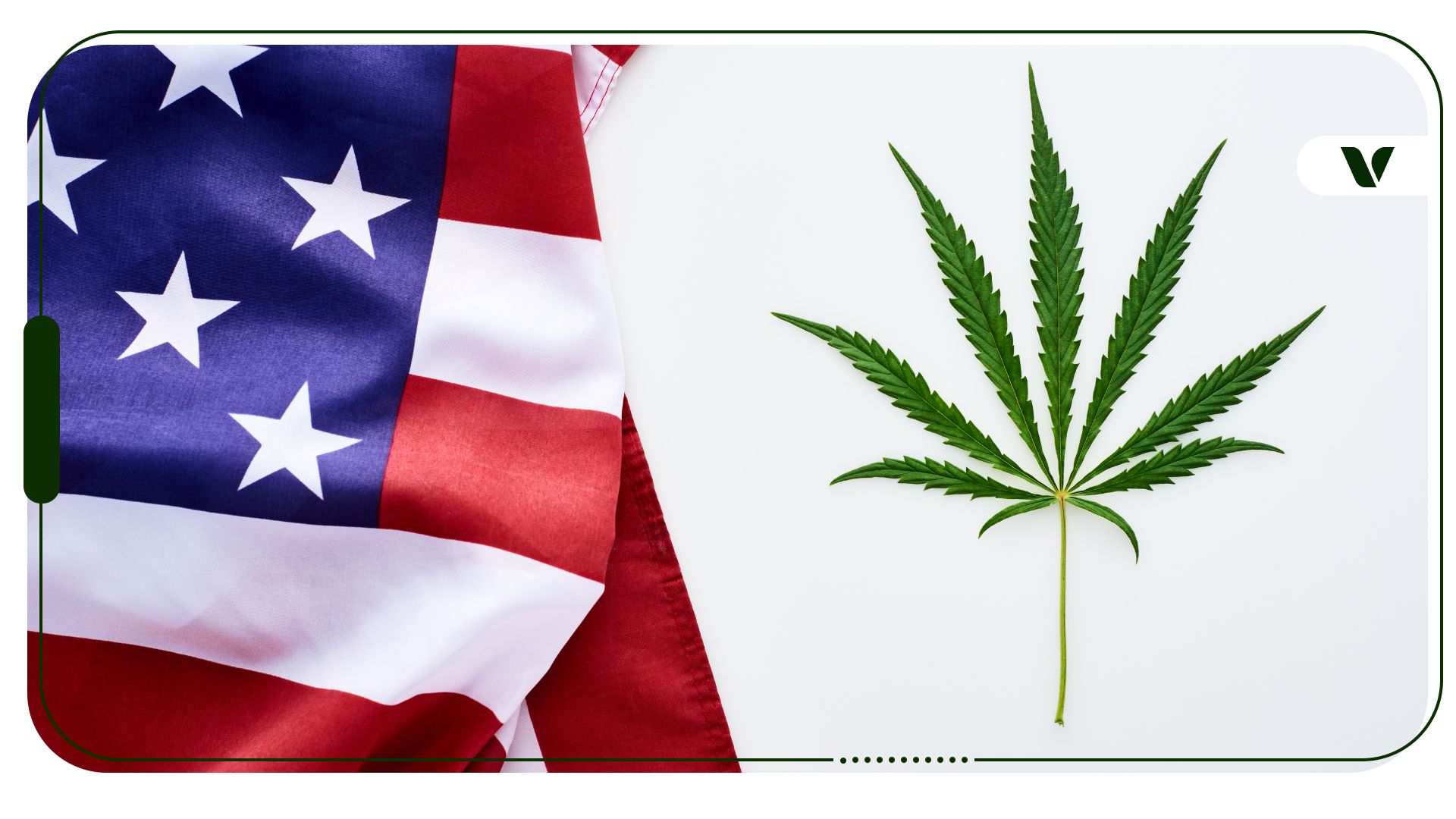The country is preparing for a second term under the Trump Administration, and cannabis reform will likely be at a standstill during this change for the Oval Office.
While on his campaign tour, President Trump hinted at supporting moving cannabis to Schedule III. If he follows through on this support, it could potentially ease regulatory burdens while also acknowledging the plant’s therapeutic benefits. Trump made movements during his first term with the 2018 Farm Bill, and he even endorsed a Florida ballot initiative for recreational legalization, though it ended unsuccessfully.
Trump’s changing stance on cannabis reform has been met with scrutiny, and industry advocates and insiders are wondering what to expect from the path ahead.
Trump’s Views on Cannabis Have Shifted
Eyes are coming down on the Trump Administration. Since 2012, when Washington and Colorado led the legalization of recreational cannabis, more than 24 states have followed, with 38 embracing some form of medical cannabis.
When Trump signed the 2018 Farm Bill, he rang in a new era of legal hemp production. Concurrently, the administration also decided to rescind the 2013 Cole Memorandum. This memo to federal prosecutors stated that they should not pursue marijuana-related convictions in states where it is legal. Rescinding it highlighted a paradoxical shift under the Trump administration: while the 2018 Farm Bill federally legalized hemp production, rescinding the Cole Memorandum increased uncertainty and risk for state-legal marijuana operations by reintroducing the potential for federal enforcement.
Additionally, Trump’s 2021 budget proposal included a controversial move to strip federal protections for state medical cannabis programs.
Trump’s historically unclear stance on cannabis sets the stage for unpredictability under his returning administration. With hope and concern on American citizens’ minds, Trump’s new cabinet members also have inconsistent views on cannabis reform — pointing toward an uncertain future.
How Do Republicans Feel About Cannabis Reform?
To prepare for taking office on January 21, Donald Trump gave insight into his picks for the Cabinet and administration. While Congress has the ultimate power to decide on cannabis reform, Trump selections like Attorney General Pam Bondi and acting DEA administrator Derek Maltz may have extensive influence.
These aren’t the only positions with influence, however. The appointment of John Thune, a known critic of cannabis reform, as Senate Majority Leader by Trump could lead to potential clashes between the Department of Justice and the Senate on the future of cannabis laws.
However, not all of the news is grim. There are newer bipartisan efforts to tackle federal cannabis regulation, and legalization indicates that not all conservatives are against these developments — for example, four red states have legalized marijuana in recent years.
Pam Bondi
After Trump’s initial nomination for Attorney General, Matt Gaetz, fell through in November, he quickly pivoted to former Florida Attorney General Pam Bondi. Bondi served in this position from 2011 to 2019 and became known for her tough stance on crime and drug trafficking. She also played a role in addressing the opioid and fentanyl crisis during Trump’s first term.
Bondi’s record on cannabis, however, has been controversial, and she has often not been in favor of progressing marijuana legalization. During her time as attorney general, she opposed a 2014 amendment to legalize medical cannabis in Florida, arguing that its language was misleading. She also supported the state’s smokable cannabis ban, which lasted until 2019 when Governor Ron DeSantis ended the ban.
Despite criticism, Trulieve CEO Kim Rivers defended her anti-cannabis stance by suggesting she was merely following the governor’s direction. It’s unclear at this time if Bondi will align with Trump’s cannabis policies, which may potentially include more progressive moves like rescheduling marijuana.
Robert F. Kennedy Jr.
The nomination of Kennedy, also known as RFK Junior, as Secretary of Health and Human Services (HHS) has sparked controversy to a considerable level. His unconventional views on topics like vaccines and fluoride have caused concerns for many Americans as he speaks about being on a mission to combat corruption in health agencies.
Kennedy has shared his vision to overhaul public health policies. He addressed the growing crisis of chronic diseases and advocated for the legalization of cannabis and psychedelics for medical benefits such as depression and addiction. This view could impact federal laws focusing on taxes to fund recovery programs.
Although he pushes for medical cannabis use, Kennedy has also spoken on the importance of strict regulations. He hopes to prevent exploitation by corporations for the benefit of public welfare.
The proposed reforms by Kennedy point towards a future of more proactive approaches to research and expanding therapeutic uses of cannabis and psychedelics. His influence with federal agencies like the FDA could bring about progress in the medical understanding of cannabis and psychedelics.
Dave Weldon
The Trump Administration has appointed former Rep. Dave Weldon to the Centers for Disease Control (CDC), and questions are arising about the future we can expect under such a wide variety of opinions and stances.
Weldon holds a voting history against measures to protect state medical cannabis programs, which has raised concerns among supporters for policy change. His strong opposition to the medical benefits of cannabis, as stated during a 2001 House hearing, suggests a challenging road ahead for reform efforts.
“Why on Earth would this nation want to unleash another dangerous substance on our population? Thousands and thousands of people will not use marijuana because it’s illegal who will start using it if it is ever made legal,” he said. “To contend that there are medical indications for this drug is, in my opinion, patently absurd.” He is a staunch believer that cannabis is a gateway drug, which is a harmful stigma against the plant.
Derek Maltz
The Drug Enforcement Administration announced on Monday that Derek Maltz will serve as acting administrator. Though President Trump still has not announced his choice for the official DEA administrator, Maltz’s return to the organization is causing anxiety for cannabis advocates and industry stakeholders. Throughout his career, Maltz has made tabloid-level claims about cannabis and its users. In 2022, he made a statement, suggesting a link between “obsessive pot smoking” and “increased info on school shooters” (a claim that Trump later reinforced). Just this month, he voiced pushback for the U.S. Department of Health and Human Services’ plan to reschedule cannabis from Schedule I to Schedule III of the Controlled Substances Act. As this reschedule was giving cannabis advocates hope for more research opportunities and better informed healthcare practices, Maltz’s leadership in the DEA (if permanent) could quash this hope.
Final Thoughts
In addition to Trump’s administrative picks, a new non-governmental advisory body will feature figures like Elon Musk and Vivek Ramaswamy — fortunately, both are known supporters of cannabis and psychedelics. The addition of these views on drug enforcement strategies could shape recommendations for reform.
Ultimately, the new Trump Administration offers a conflicting view of the next four years. With differing viewpoints and potential policy shifts, the industry may find itself at a major turning point as the nominations of figures like Pam Bondi and Robert F. Kennedy Jr. add layers that are difficult to predict.
As reform supporters continue to navigate these developments, one thing remains clear: the future of cannabis reform under the Trump Administration is primed for significant shifts and debates.
Author, Share & Comments








